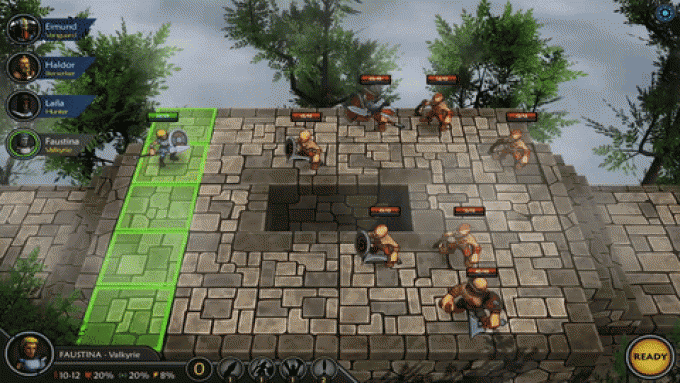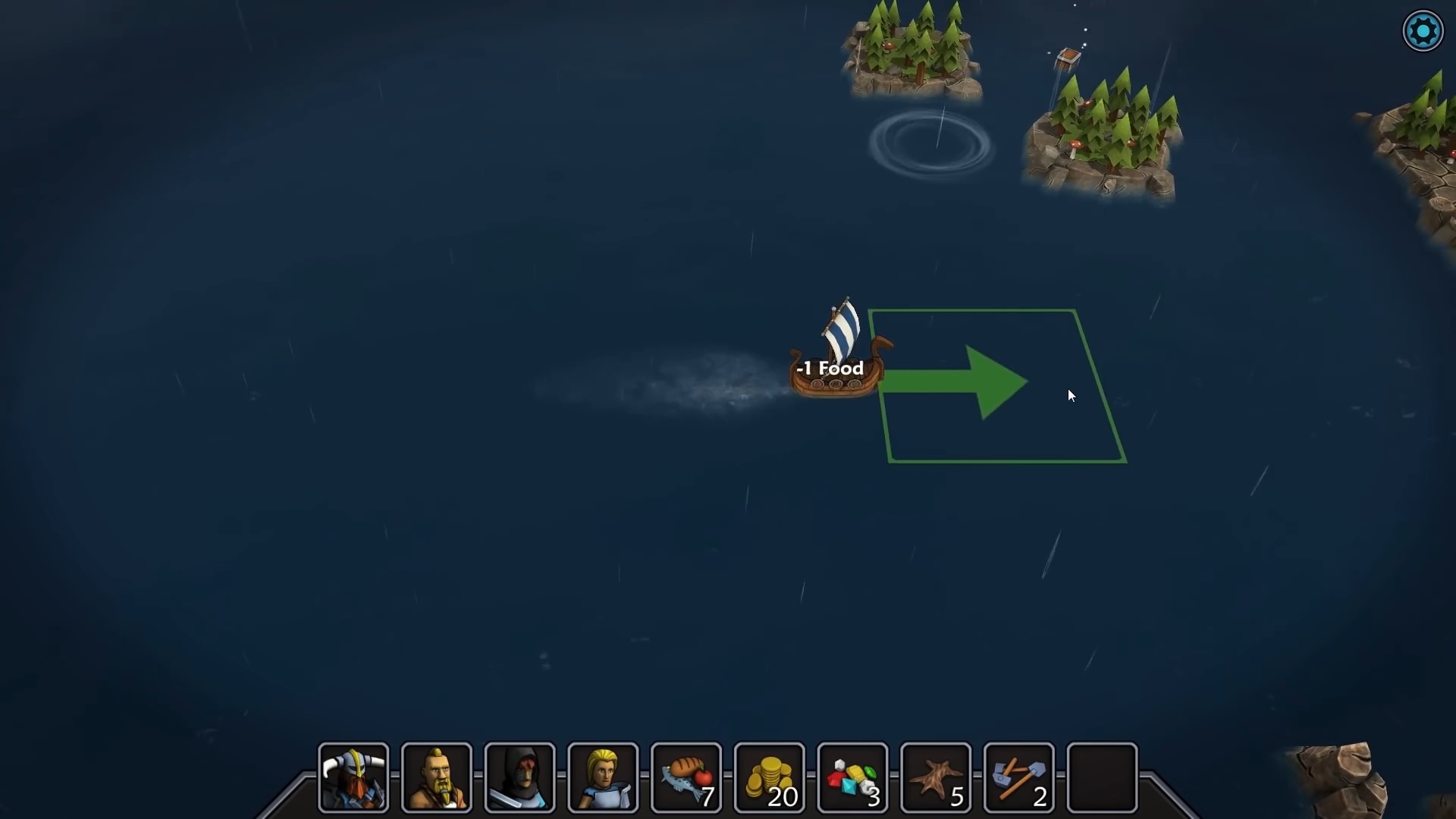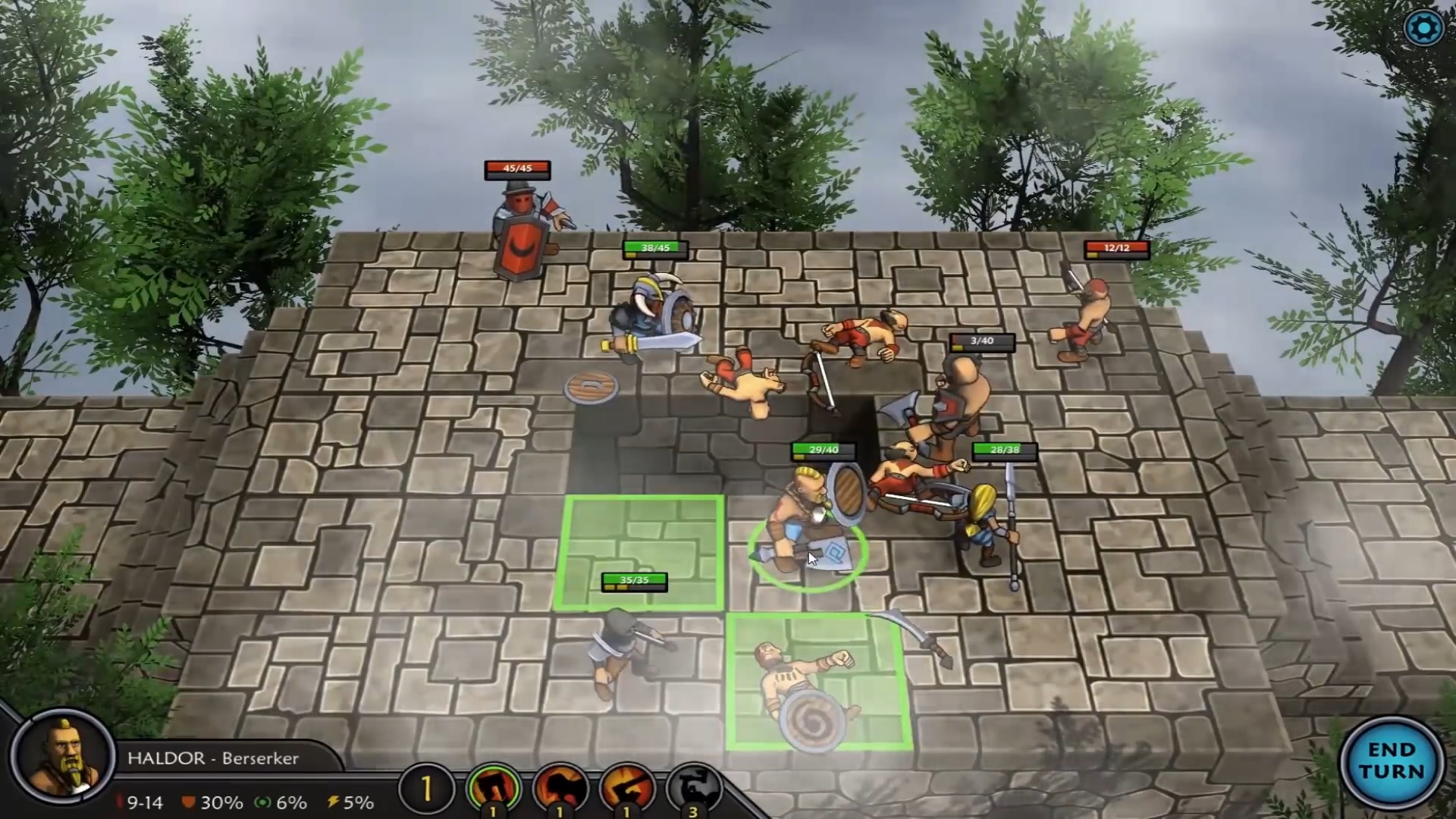We first wrote about Crash Wave’s Iron Tides back in May, and former Cliqist writer Conrad Crisman was excited for it. The Kickstarter campaign recently launched after going through the Square Enix Collective program. So we had a chat with one of the developers on the game, Carina Kom.
Iron Tides is a rogue-lite survival, exploration, and tactical combat RPG with a Viking theme. The game’s world is a lot like Sunless Sea in that you control a ship out at sea. The difference however is that you play a Viking chieftain, commanding a your “loot-hungry warband” across seas and oceans in search of plunder. You have freedom to travel wherever you want, and how fast you want to go.
Speed and distance are killers though, as longer, faster voyages burn through supplies quicker. But you need to balance that with your crew’s lust for blood. To keep their lust for treasure satiated, you must go on raids, constantly going farther and farther off into the unknown seas.
Fast and bloody
We got a brief glimpse of the combat in the introduction trailer back in May, as well as Joanna’s video of the pre-alpha demo. According to Carina, the combat will play a big part of the game, and you’ll have to tailor how you play around it. Kom described battles as fast, bloody, and resource intensive. “Despite being turn-based, combat in Iron Tides is designed to be quick, dynamic and brutal.” Through the combination of fast-paced combat and brutal difficulty, Iron Tides sounds like you’ll constantly have to make difficult decisions about when to attack, when to run, and which of your allies you must sacrifice.
There’s also a unique resource in the game called Fury, which dictates how your battles progress. The Kickstarter page describes it as an “action point system” that you’d expect to find in a typical RPG. The Fury points can be used to activate special abilities, and are replenished after each turn. Placement of your fellow Vikings matters though, as you’ll get more Fury depending on how close they are to each other. Because of this, Kom says “The focus is always on the action and on making critical choices. Instead of moving and attacking the same way every turn, the pace of battle changes dramatically.”
If you’re worried about there being too much combat, Kom says they’re focusing just as much on the rogue-like exploration elements. “We’ve put a lot of thought into procedurally generated levels and so the game can also be played as an endless adventure. Players can spend up to 30 minutes exploring the first level because it is addictive to uncover submerged islands and treasure while raiding and exploring.”
Lightweight strategy survival
Crash Wave are trying hard to make the game appeal to as many players as possible, but they realize they can’t attract everyone. With that in mind, the game is being “designed for players who enjoy lightweight strategy survival resource-management games.”
 It all seems highly ambitious. Looking over the proposed features and the gameplay videos, you can see a lot of work and effort has gone into the game already. They’re clearly ambitious, and ambition always leads to the desire for bigger and better things. But Crash Wave believes they can pull it off, keep their scope in check, but so does every other developer. So what makes Kom and her partner, Sam Raski, qualified?
It all seems highly ambitious. Looking over the proposed features and the gameplay videos, you can see a lot of work and effort has gone into the game already. They’re clearly ambitious, and ambition always leads to the desire for bigger and better things. But Crash Wave believes they can pull it off, keep their scope in check, but so does every other developer. So what makes Kom and her partner, Sam Raski, qualified?
“My own background is in design and analysis,” she told me, “in which I use numbers to balance and provide foresight and validation in my work.” She’s even more active in the industry, advocating for diversity in gaming alongside other Vancouver studios and “a board of influential women.” As far as Raski, he developed Facebook games for years at East Side Games, which is where the two met. Between the two of them, Kom tells me they have 14 years of experience in the industry and that’s why they’re so confident.
Fresh, experienced, and ambitious
They do seem to lack experience making games on this level though. They also don’t have experience crowdfunding games either. Is that a red flag? There are likely just as many people who won’t mind as there are people who are turned off. Me, put me in the “I don’t mind” camp. Kickstarter is a place for new developers as much as it is with the older generation remaking their own games. The campaign has been a success so far, raising nearly $7,000 in its first several days. At this rate, its projected to raise over $22,000 CAD, 120% of their goal.
 Kom agrees with that sentiment. “Having a big name attached to a project undoubtedly garners a lot of attention, and helps give backers a sense of trust. […] However, much of that ground can also be covered with a solid proof of concept and effective communication. As an unknown entity you have a lot more work to do in order to earn people’s trust and attention. You won’t get it if all you have is a few ideas and drawings. But people believe what they see. If you can deliver an amazing trailer or demo that clearly conveys a feeling, a lot of them will jump on board.”
Kom agrees with that sentiment. “Having a big name attached to a project undoubtedly garners a lot of attention, and helps give backers a sense of trust. […] However, much of that ground can also be covered with a solid proof of concept and effective communication. As an unknown entity you have a lot more work to do in order to earn people’s trust and attention. You won’t get it if all you have is a few ideas and drawings. But people believe what they see. If you can deliver an amazing trailer or demo that clearly conveys a feeling, a lot of them will jump on board.”
She points to games like Darkest Dungeon and The Banner Saga as examples of developers lacking experience who still turned out great games through Kickstarter.
If the ambition worries you, know that Crash Wave isn’t going it alone. They’ve partnered with Square Enix, through the Square Enix Collective. The Square Enix Collective is a spotlight program, similar to Steam Greenlight, in which developers can pitch their games on Square Enix’s website. It’s for developers who are gearing up for a crowdfunding run on another website and want to get feedback from potential backers. Square Enix also helps the developers with publishing as well as promotion.
The Square Enix Collective
It’s not a new program. Several games are a part of the Square Enix Collective. Tokyo Dark, an anime inspired adventure game, raised $225,386 CAD in June 2015. Moon Hunters, Children of Zodiarcs, and XO are all Square Enix Collective games that found success on Kickstarter.
 “The Square Enix Collective is something we consider a necessary step, or test, before finding the correct crowdfunding platform,” Kom told us. She said it took them a month just to prepare the SEC page. “We received critical feedback that altered the way we think about Iron Tides, and we were able to assess our progress just by the number of votes and YES ratings that impacted our score.”
“The Square Enix Collective is something we consider a necessary step, or test, before finding the correct crowdfunding platform,” Kom told us. She said it took them a month just to prepare the SEC page. “We received critical feedback that altered the way we think about Iron Tides, and we were able to assess our progress just by the number of votes and YES ratings that impacted our score.”
Was it worth the effort though? “Developers have to know enlisting sites like SEC guarantee your game will get noticed by a traditional publisher. Of course this is offset by the work it takes to launch a campaign on the site and there is no further guarantee they will support you afterwards.” That being said, they understand that just because they have the backing of Square Enix doesn’t guarantee a successful Kickstarter.
As you would expect, most of the “no” voters left no comment. It’s like dropping a dislike on a YouTube video; that information could help the creator, but if you don’t leave feedback, it’s useless. Although, “most of our commenters had something pleasant to say, and we followed up with many of them.”
 To that end, Crash Wave intends on listening to its community. “With [the Kickstarter] community, we aspire to build Iron Tides with all of our focus and energy, using their feedback to guide us.” Kom provided us with an example of one comment they received which illustrates exactly what feedback Crash Wave is looking for:
To that end, Crash Wave intends on listening to its community. “With [the Kickstarter] community, we aspire to build Iron Tides with all of our focus and energy, using their feedback to guide us.” Kom provided us with an example of one comment they received which illustrates exactly what feedback Crash Wave is looking for:
“I hope you get all the crowdfunding you need to expand on this a bit though. I think a bit more customization would go a long way. Maybe add class promotions; it’s rare to find strategy rpgs with class promotions these days even though gamers really love them.”
This is generally the kind of feedback you only find with crowdfunded games. From what I’ve heard, I have faith that Crash Wave can pull this off. They’re ambitious, they’re willing to listen to feedback, and they’ve got help from Square Enix.
It’s all just talk and marketing right now though. Whether or not they can actually follow through on Iron Tides’ promise is something we have to wait to see for ourselves. There’s still three weeks left in the campaign, and an estimated eight months until release. In game development, that can practically be an eternity.



